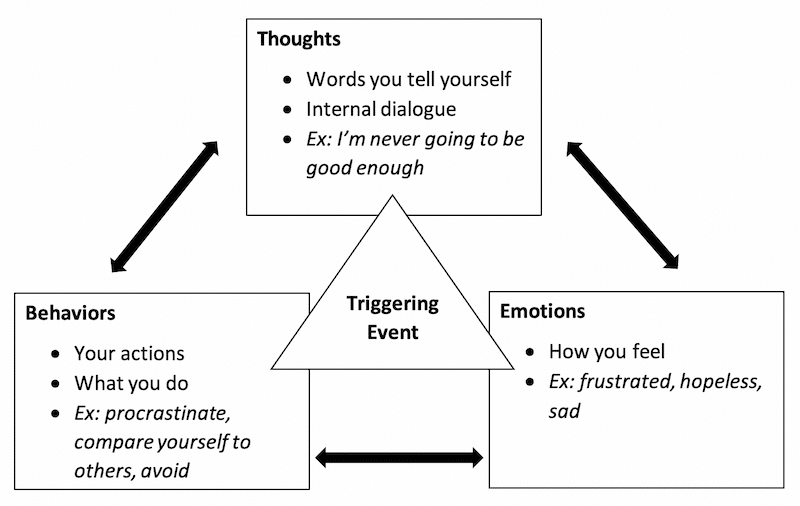Cognitive Behavioral Therapy (CBT) for Victim-Survivors of Sexual Assault

CBT is an evidence-based therapeutic approach that can offer meaningful support to victim-survivors of sexual assault. CBT aims to help individuals manage the emotional and psychological effects of trauma, by focusing on the connection between thoughts, feelings, and behaviors.1, 2 This form of therapy empowers survivors to develop healthier coping strategies and regain a sense of control over their lives.

CBT helps victim-survivors identify and challenge negative thought patterns that may contribute to emotional distress.1-3 For example, many victim-survivors experience self-blame, guilt, or feelings of worthlessness.3 CBT helps by providing skills to recognize negative thoughts and replace them with more realistic perspectives. By shifting how they think about themselves and their experiences, victim-survivors can reduce anxiety, depression, and post-traumatic stress symptoms.3-6
There are specific techniques used in CBT that may be particularly helpful for victim-survivors like:
Cognitive Restructuring: This technique involves identifying distorted or irrational thoughts and reframing them in a more positive and realistic light.7
Exposure Therapy: A safe, gradual exposure to trauma-related memories or triggers can help desensitize survivors and reduce the intensity of their emotional responses over time.7
Behavioral Activation: This method encourages engagement in meaningful activities to counteract feelings of withdrawal and isolation that are common after trauma.7
Relaxation Training: Mindfulness and deep breathing exercises are often incorporated to help survivors manage anxiety and regain a sense of calm.7
One of the key advantages of CBT is its design to be structured and goal-oriented.4 Victim-survivors work alongside their therapist to set goals and track progress, providing a roadmap for healing. CBT also focuses on building practical skills that victim-survivors can use in their day to day to cope with triggers, flashbacks, and overwhelming emotions, and negative thinking patterns. CBT can assist victim-survivors in developing resilience, reduce anxieties, and provide positive coping skills to manage distress.6-7
It’s important to remember that not every type of therapy works for everyone, and not every therapist is the right fit. If CBT isn’t right for you, there are other options available.
Sources
- Iverson, K. M., Gradus, J. L., Resick, P. A., Suvak, M. K., Smith, K. F., & Monson, C. M. (2011). Cognitive–behavioral therapy for PTSD and depression symptoms reduces risk for future intimate partner violence among interpersonal trauma survivors. Journal of consulting and clinical psychology, 79(2), 193.
- Cohen, J. A., Mannarino, A. P., Kliethermes, M., & Murray, L. A. (2012). Trauma-focused CBT for youth with complex trauma. Child abuse & neglect, 36(6), 528-541. https://doi.org/10.1016/j.chiabu.2012.03.007
- Hofmann, S. G., Asnaani, A., Vonk, I. J., Sawyer, A. T., & Fang, A. (2012). The efficacy of cognitive behavioral therapy: A review of meta-analyses. Cognitive therapy and research, 36, 427-440.
- Beck, J. S. (2011). Cognitive-behavioral therapy. Clinical textbook of addictive disorders, 491, 474-501.
- Kazantzis, N., Luong, H.K., Usatoff, A.S. et al. The Processes of Cognitive Behavioral Therapy: A Review of Meta-Analyses. Cogn Ther Res 42, 349–357 (2018). https://doi.org/10.1007/s10608-018-9920-y
- Olatunji, B. O., Cisler, J. M., & Deacon, B. J. (2010). Efficacy of cognitive behavioral therapy for anxiety disorders: A review of meta-analytic findings. Psychiatric Clinics of North America, 33, 557–577. https://doi.org/10.1016/j.psc.2010.04.002
- Leichsenring, F., Hiller, W., Weissberg, M., & Leibing, E. (2006). Cognitive-behavioral therapy and psychodynamic psychotherapy: techniques, efficacy, and indications. American journal of psychotherapy, 60(3), 233-259.



